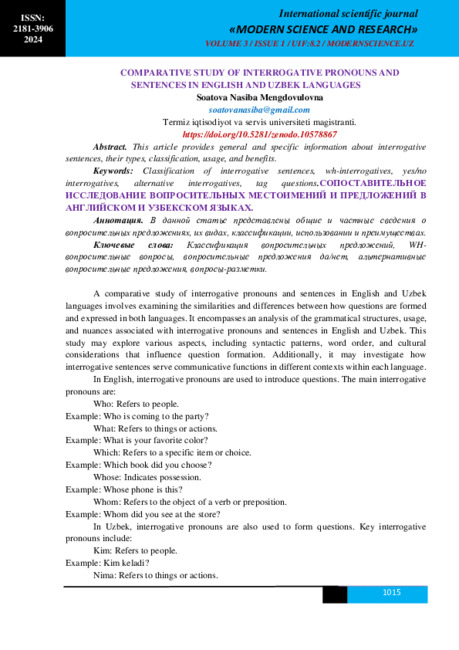
ISSN:
2181-3906
2024
International scientific journal
«MODERN
SCIENCE
АND RESEARCH»
VOLUME 3 / ISSUE 1 / UIF:8.2 / MODERNSCIENCE.UZ
1015
COMPARATIVE STUDY OF INTERROGATIVE PRONOUNS AND
SENTENCES IN ENGLISH AND UZBEK LANGUAGES
Soatova Nasiba Mengdovulovna
Termiz iqtisodiyot va servis universiteti magistranti.
https://doi.org/10.5281/zenodo.10578867
Abstract. This article provides general and specific information about interrogative
sentences, their types, classification, usage, and benefits.
Keywords: Classification of interrogative sentences, wh-interrogatives, yes/no
interrogatives,
alternative
interrogatives,
tag
questions.
СОПОСТАВИТЕЛЬНОЕ
ИССЛЕДОВАНИЕ ВОПРОСИТЕЛЬНЫХ МЕСТОИМЕНИЙ И ПРЕДЛОЖЕНИЙ В
АНГЛИЙСКОМ И УЗБЕКСКОМ ЯЗЫКАХ.
Аннотация. В данной статье представлены общие и частные сведения о
вопросительных предложениях, их видах, классификации, использовании и преимуществах.
Ключевые
слова:
Классификация
вопросительных
предложений,
WH-
вопросительные вопросы, вопросительные предложения да/нет, альтернативные
вопросительные предложения, вопросы-разметки.
A comparative study of interrogative pronouns and sentences in English and Uzbek
languages involves examining the similarities and differences between how questions are formed
and expressed in both languages. It encompasses an analysis of the grammatical structures, usage,
and nuances associated with interrogative pronouns and sentences in English and Uzbek. This
study may explore various aspects, including syntactic patterns, word order, and cultural
considerations that influence question formation. Additionally, it may investigate how
interrogative sentences serve communicative functions in different contexts within each language.
In English, interrogative pronouns are used to introduce questions. The main interrogative
pronouns are:
Who: Refers to people.
Example: Who is coming to the party?
What: Refers to things or actions.
Example: What is your favorite color?
Which: Refers to a specific item or choice.
Example: Which book did you choose?
Whose: Indicates possession.
Example: Whose phone is this?
Whom: Refers to the object of a verb or preposition.
Example: Whom did you see at the store?
In Uzbek, interrogative pronouns are also used to form questions. Key interrogative
pronouns include:
Kim: Refers to people.
Example: Kim keladi?
Nima: Refers to things or actions.

ISSN:
2181-3906
2024
International scientific journal
«MODERN
SCIENCE
АND RESEARCH»
VOLUME 3 / ISSUE 1 / UIF:8.2 / MODERNSCIENCE.UZ
1016
Example
:
Nimani sevdingiz?
Qaysi: Refers to a specific item or choice.
Example: Qaysi kitobni tanladingiz?
Kimsan: Indicates possession.
Example: Kim bu telefondagi?
Kimni: Refers to the object of a verb or preposition.
Example: Kimni do'konida ko'rdingiz?
Interrogative sentences in English are formed by inverting the subject and auxiliary verb
or using a question word at the beginning of a sentence.
Example: Are you coming to the party?
The interrogative pronoun for ‘what’ is involved in the construction of a sentence is given
by the speaker to the listener to determine the purpose and cause of the action, situation, event -
the reality of the event, and serves as an adverb in the sentence. If we analyze the similarities and
differences of interrogative pronouns in English and Uzbek languages, we may observe the
following: The semantic features of the interrogative words "who" in English and "kim" in Uzbek
can be interpreted similarly: Who can cook pilav? Kim palov pishira oladi? According to U.
Tursunov and A. Mukhtorov, interrogative pronouns refer to the subject, its sign and quantity, the
place and time of the action, and other features. Using the interrogative pronouns, the speaker tries
to identify information from the listener about something that is unfamiliar to him - the subject,
the event - the event and the action [1]. Agreeing to this conception H. Muhiddinova describes
interrogative pronouns as interrogative pronouns used by the speaker to identify information about
an object - an event, and an action, which means that it is the function of the word group in the
sentence [2]. As we know Uzbek language refers to agglutinative group while English language
refers to analytical. For that reason, some grammatical contrasts can be observed. Being an
analytical language English does not mark interrogative words ‘who’ and ‘what’ as the derived
affixes it belongs to. For example, the word what possesses the category of substantive when it
denotes noun while when it is before the noun it denotes an adjective. For example, ‘What is on
the table?’ ‘What book did you read?
REFERENCES
1.
Academic Databases: Utilize databases like JSTOR, Google Scholar, or PubMed. Use
relevant keywords such as "interrogative sentences classification" to find academic articles.
2.
Check the catalogs of your local library or university library. Librarians can assist you in
finding relevant books on the topic.
3.
Libraries: Websites like Project MUSE, ResearchGate, or the Directory of Open Access
Journals (DOAJ) may have articles related to your query..





